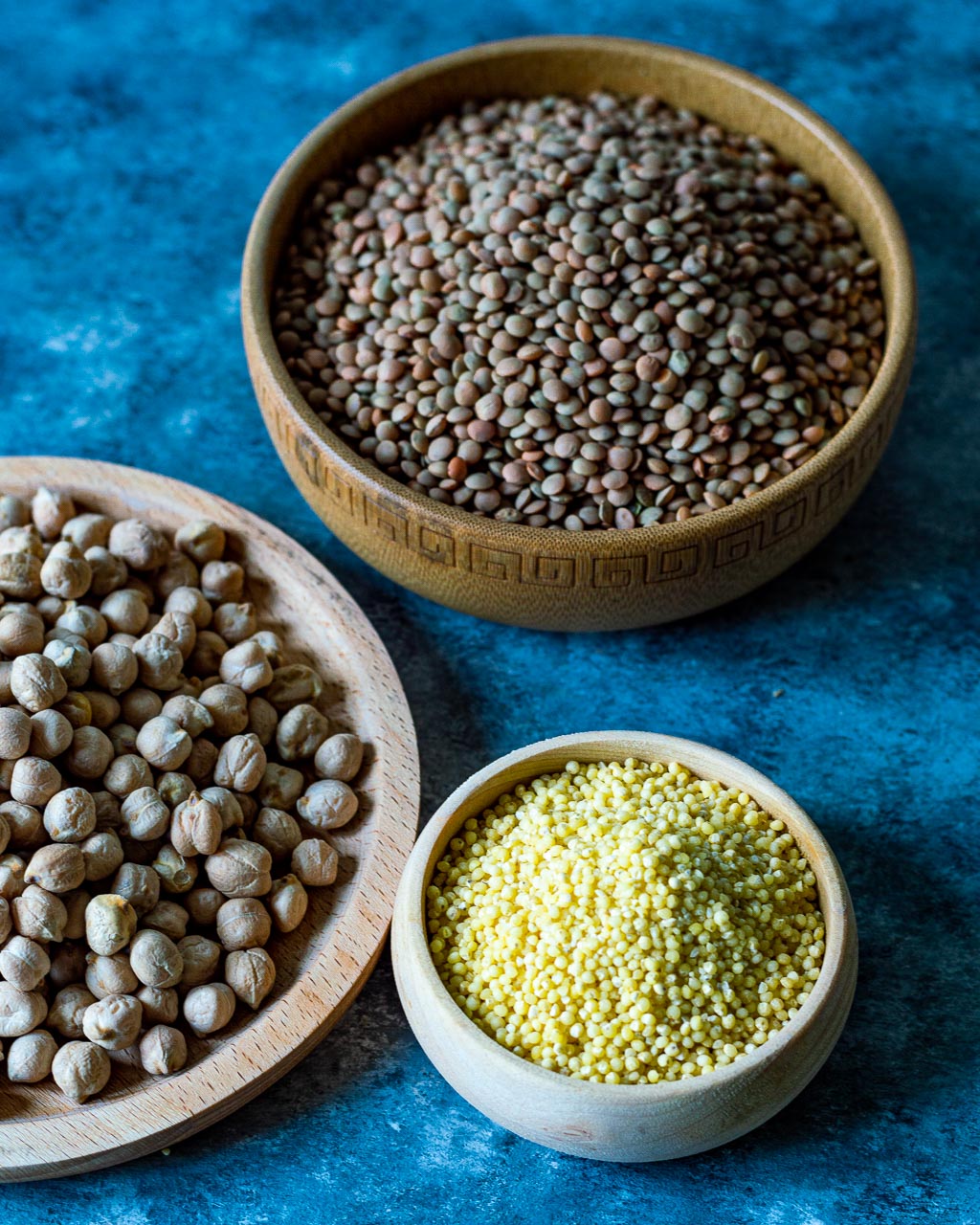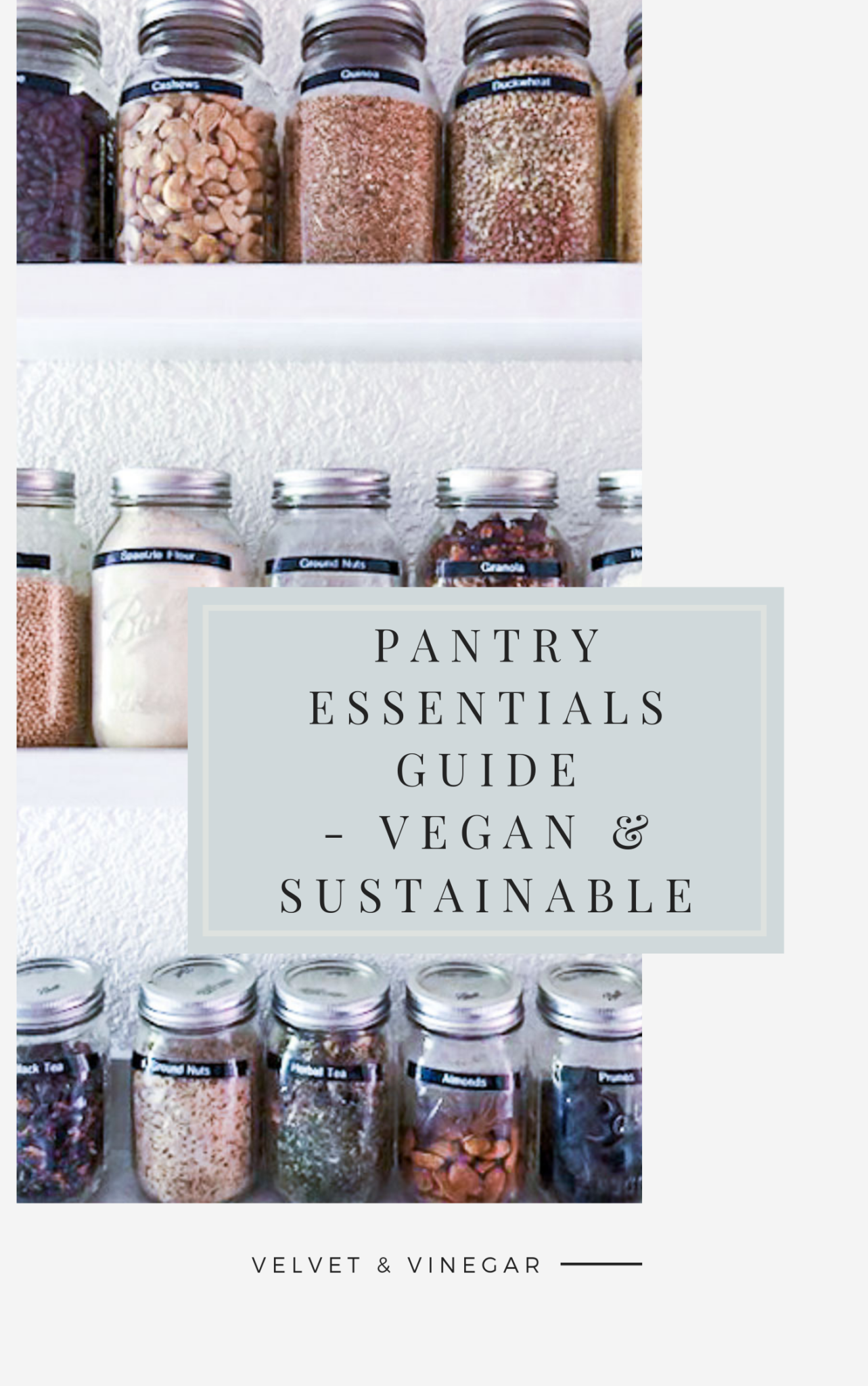This blogpost also is available in German.
Are you ready for part two of the pantry series? Last week we talked about why you should build a pantry if sustainability is important to you. Today I’ll tell you what ingredients you need to stock your vegan pantry with. On the one hand in relation to a varied and healthy vegan diet, on the other hand in relation to sustainability. At the end of this article you`ll also find a list – grouped by food groups – with the most important ingredients.
At the beginning I would like to say briefly; I am a food blogger, so my pantry is probably very extensive. This may also be reflected in this article. Although I have tried to limit myself to the essentials, it`s very possible that there are some foods that are unimportant for you. Today’s list is not binding either, feel free to pick out the ingredients that are right for you. In my pantry guide you’ll also find the foods I think are an absolute must for a healthy vegan diet. So, if you’re just about to start a plansbased diet, want to eat more vegan dishes or are just about to set up a vegan pantry, then the guide is definitely worth downloading and reading!
What is the definition of a pantry?
Second, last week I received some feedback on the subject of pantries. Thank you very much… This made it clear to me, that I didn’t explain to you my personal definition of a pantry. A few honest readers have written to me that it is simply unrealistic to create a pantry because many people don`t have the space. That’s true, of course, if you `re thinking pantry in the classical sense as you know it from America.
For me personally, a pantry is neither a separate room, nor one of those giant cupboards you find when you search for an online search. For me, a pantry is simply a way of storing supplies. We live in a three-room apartment with a moderate kitchen. I have no extra room or storage for my supplies. I keep everything in the kitchen cupboards and a rack that we attached to a free wall. Everybody can set up a small pantry, if you make the best out of your available space. We’ll also discuss this topic in one of the following contributions to this series.
Enough chatter, now to the actual topic.
What is essential to a vegan & sustainable pantry?
Three things belong in a sustainable pantry, a zero waste storage system, a correct sustainable management, local & seasonal products in organic quality. We will talk about the first two points in the next blog posts of this series. Today we want to focus exclusively on food.
Was does local, seasonal & organic quality mean for a pantry?
Why do regionality, seasonality and organic quality belong to a sustainable lifestyle? I`ve kind of explained that already here and here. For the pantry this specifically means the following:
- find weekly farmer markets & bulk shops that offer local whole foods in organic quality.
- buy certain stocks when they are in season. This applies especially to nuts and seeds.
- prefer local alternatives to imported food. Millet instead of quinoa, flaxseeds instead of chia seeds.
- Start to collect! Many great ingredients, such as herbs, nuts or seeds can be found in nature. Just take a walk, observe your surroundings, take what you need, but always leave something for the animals and insects!
- Start jarring! Preserve your food, dry plums, herbs, berries and other fruits or pumpkin seeds yourself, make your own tea blends, your own yoghurt, your own plantbased milk. There`s so many things you can do yourself without too much effort.
By the way, the last two points have a lot to do with zero waste, which is why we will certainly encounter them again in a later article in this series.
Which ingredients are essential for a vegan pantry?
But now to the most important question, which ingredients do you need in your pantry? Here you’ll find a list of the most important whole foods you should stock your pantry with. Further I would like to recommend you once again my pantry guide, there you find a compilation of the essential foods for a vegan pantry. All you have to do is sign up for my newsletter and you`ll get the guide directly into your inbox.
Oil & Vinegar
When buying oil I always pay attention to high quality and cold pressing method. Refined oil has been chemically treated and many nutrients are missing. Organic quality is just as important here, because otherwise pesticide residues may be present in the oil. Furthermore, the correct ratio of omega-3 to omega-6 fatty acids should always be observed. Healthy oils are either rich in omega-3 or at least vitamin E (only healthy oils are listed here).
When using vinegar, pay attention to the vegan seal, as these are often clarified using animal products.
- canola oil
- flaxseed oil –> One of the healthiest oils, but it shouldn`t be heated. Unfortunately, it quickly turns rancid, so try to keep it in the fridge after openig. It works great in smoothies or in raw food if you like the taste. I also like to put it in marinades where you want to get that fake fish taste, for example poke bowls or carrot lox.
- hemp oil –> Great alternative to flaxseed oil, in case you don`t like that one. Hemp oil isn`t suitable for heating either.
- olive oil –> Although low in omega-3 fatty acids, it`s very rich in vitamin E. Always look out for extra virgine olive oil in good quality. Unfortunately it`s not available locally, but at least you can find it in bulk stores.
- sesame oil –> Which I mainly use for Asian or oriental dishes. Again not a locally produced and hardly available in bulk stores, so I use it moderately.
- coconut oil –>Mainly consists of saturated fatty acids, but is very rich in vitamin E. Due to it`s strong taste, I rarely use it for cooking. It`s great for roasting food in the oven to crunchyness (instead of peanut oil), as well as for raw cakes, granola, bliss balls, etc. It`s properties of being solid at room temperature comes in very handy for certain dishes, like making your own feta or icings.
- balsamic vinegar
- herb-infused white wine vinegar
- apple cider vinegar –> Not only healthy, but also great for baking. Especially in combination with baking soda as an egg substitute.
- rice vinegar –> Mainly for Asian sauces and dishes.
Baking essentials
You’re an enthusiastic baker? Then these ingredients should definitely not be missing in your pantry.
- whole wheat flour
- spelt flour
- rice flour (gf) –> Perfect for Asian dishes and desserts, as well as for glutenfree baking.
- coconut flour (gf) –> In case you like the taste coconut, this flour can be a great glutenfree alternative when baking sweets, like this crumble cake. Just be aware that coconut flour tends to absorb a lot of liquid and can get soggy quite quickly.
- almond flour (gf) –> Another great glutenfree flour option, if you keep in mind the taste and it`s properties.
- buckwheat flour (gf) –> Not one of my favorite glutenfree options, as I don`t like it`s bitter taste. But if you like buckwheat flour it can be a great choice for glutenfree baking. Also works great for pasta and pizza dough.
- chickpea flour (gf) –> The perfect glutenfree flour for falafel, vegan omelettes and spaetzle. Also works great as a binding agent.
- maple syrup
- date syrup
- rice syrup
- molasses
- agava syrup
- xylitol
- brown sugar –> Personally I mostly use brown sugar for yeast dough, as it`s definitely needed there. For other baking I mainly use the sweeteners mentioned above.
- fresh yeast –> Of course you can also store dry yeast, I prefer the fresh one, which is why we always have a package of it stored in the fridge.
- vanilla pods
- vanilla extract
- bourbon vanilla powder
- raw cocoa powder –> A must have in every vegan kitchen, besides vanilla. Sadly there aren`t any sustainable, local options to cocoa and vanilla. Or at least I haven`t found any.
- potato starch
- corn starch –> Both type of starches are perfect for binding sauces or for baking.
- baking powder
- baking soda –> Try to buy these two in unpacked stores or in the pharmacy, as they offer them in bulk. Supermarkets usually sell small sealed bags, which are used up in a blink, if you bake frequently. Besides that baking soda is also crucial for making your own natural cleaners and soap for washing.
- ground nuts –> You don`t need to buy these in a store. If you have a food processor or high-performance blender, you can just grind some nuts from your pantry, which is way more sustainable and reduces plastic.
Grains, pasta & rice
- brown rice
- basmati, jasmin or perfume rice
- risotto rice
- sushi rice
- millet / couscous
- bulgur
- oats
- granola –> Try to make your own granola, it`s super easy, a batch is mixed up in 10 minutes and you know exactly what type of ingredients are in your granola. Not to mention, you save money and reduce waste.
- semolina –> Especially essential if you want to make your own pasta, but also great for porridges or pudding.
- cornmeal
- spaghetti
- varied pasta –> Stick to whole grain pasta or spaghetti whenever you can. Or make your own pasta if you like. Lot`s of times pasta options in bulk stores can be limited. In case you buy at the supermarket, try to stick to the brands which sell pasta in carboard instead of plastic.
- buckwheat
- quinoa –> It`s a great and healthy ingredient, but unfortunately not very sustainable. Look out for local producers if possible.
- barley
- panco –> Personally I prefer panco to regular bread crumbs, as it gives crispier results when frying. If you want to keep it zero waste make your own bread crumbs from stale bread by grinding it.
Legumes
- black beans
- white beans
- kidney beans
- borlotti beans
- soy beans
- brown lentils
- green lentils
- red lentils
- yellow lentils
- black lentils
- chickpeas
Nuts & seeds
- cashews
- peanuts
- walnuts
- hazelnuts
- almonds
- pine seeds
- pupmkin seeds –> You actually don`t need to buy these! Just collect all the seeds from your pumpkins during pumpking season, dry and roast them.
- sunflower seeds
- hemp seeds
- flaxseeds –> They are also great for baking, as they kind of act like an egg if combined with water. We call that flax-egg. Put them in a food processor or high performance blender and grind them until they become flourlike. Store the flaxseed flour in a separate jar and use it for waffle and pancake batters, as well as cakes. It`s true magic!
- chia seeds –> These small little buddies aren`t the most sustainable choice. So whenever you can, try to stick to flaxseeds instead of chia seeds. The only time I really use chia seeds is, if I fancy chia pudding and that`s not too often.
- sesame seeds
Dried goods
- raisins
- cranberries
- dates
- prunes
- dried berries
- different fruit powders –> These act as natural food coloring. So whenever you like to achieve a certain color in a dish or food, try to work with fruit powders, they produce beautiful shades of pink, lilac and purple.
- dried mushrooms
- spirulina powder –> Not only super healthy and great in smoothies, but also the go to option if you want to color your food anything between green, turqoise and blue. Just be aware there are two different typed of spirulina, one is green the other blue.
Spices & Herbs
Fresh herbs are a must, so this summer we have created our own small herb garden. Whatever remains at the end of the summer season will be dried and filled into glasses, like that we have dried herbs throughout the winter.
- salt
- kala namak or black salt –> Gives that egg flavor to certain dishes you seek for that, like scrambled tofu, vegan egg salad or egg sandwich.
- black & white pepper –> Depending on the color of the dish you either go for black or white pepper.
- garlic powder
- onion powder
- cayenne pepper
- paprika, smoked & sweet
- cumin, the whole seeds & ground
- coriander seeds
- chipotle powder
- chili flakes
- dried herbs, such as basil, oregano, marjoram, dill, thyme, rosemary, bay leaves and savory
- cinnamon barks
- ground cinnamon
- nutmeg
- cardamom pods
- ground cardamom
- curry powder
- ground turmeric
- ground ginger
- cloves
- ground cloves
- tonca beans
- spice & herb blends, such as z`atar, kofta spice, pumpkin spice, gingerbread or Italian herbs –> Actually you can easily mix your own spice and herb blends if you have a well stocked spice rack.
- vegetable broth / stock –> Can be prepared super easy with remaining kitchen scraps. I use to collect our kitchen scraps, put them in the freezer and as soon the bag is full I make a batch of stock. But of course I also have some bouillon powder at home in case of emergencies.
- nutritional yeast
Jarred goods:
For a short time now we have been trying to avoid anned food as much as possible and only consume unprocessed foods as far as possible. Whenever possible we buy pickled and preserved food in jars not cans.
- tomato sugo
- sun-dried jarred tomatoes
- coconut milk –> Go for the cardboard packaging instead of can.
- olives
- capers
- pickles
- tomato purée
- tahini paste
- vegan green curry paste
- vegan red curry paste
Sauces & spreads
- mustard
- vegan mayonnaise
- ketchup
- cholula sauce
- sriracha sauce
- miso paste
- minrin sauce
- soy sauce
- tabasco
- worcestershire sauce
- peanut butter
- different nut butters
- jam
Beverages
- coffee beans
- tea blends –> Avoid tea bags to reduce waste. You can also easily make your own tea blends with dried goods and tea.
- matcha powder
- wine –> Also quite essential for cooking.
- beer
vegan substitute products
- seitan powder –> Makes mixing your own batch of seitan super easy, but of course isn`t the most sustainable option, as it`s packed in plastic.
- PVP –> Great for dishes that require ground meat or for binding vegan burger patties or fritters.
- smoked tofu
- firm plain tofu
- silken tofu
- tempeh
- plantbased milk –> Can be made easily at home to avoid waste. You can find a super yummy hazelnut milk recipe in my ebook.
- plantbased yogurt –> Again, super easy to make at home. I`m still working on the perfect formula, then I`ll share a recipe with instructions with you.
- vegan parmesan, mozarella or feta –> All these three options can be made at home too. I`ll upload a vegan parmesan recipe within the next weeks. For the latter two I`m still experimenting.
This is a compilation of some foods, which should not be missing in a vegan pantry, based on the example of my pantry. Next week we will focus on how you plan and build a sustainable pantry. There`s a downloadable list, where you can see all important ingredients mentioned in this post at a glance. You can download it by clicking on the picture.
Read you soon
Sarah





